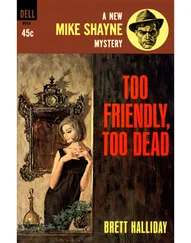“You’re a good man in a storm,” his father always insisted, whenever the boy held the tiller firm against a fresh gust. But it was really the old accountant who had needed to get out on the waves, Sam realized, if only for a way to unbend his mind and let it play among the angles of wind and water, pushing the boat to its limits. More math, when you got right down to it, but calculated on the fly, with a face to the breeze, tiller in hand, the hull’s trammeled force straining beneath his grip with the quiver of a saddled horse.
Of course, when Sam’s aptitude had emerged along similar lines as his father’s-a head for numbers, a knack for analysis-the boy had inevitably begun tacking the same general course. His father had nodded stoically at the news that Sam would seek his MBA at that eggheads’ paradise, the University of Chicago. But the man hadn’t been able to bite his tongue when, on graduation day, Sam announced he had accepted an auditor’s position at Pfluger Klaxon.
To Sam the job had sounded exciting-loads of travel, an apartment in Chelsea. Wasn’t that bohemian enough? But perhaps his father had foreseen where that course would really chart, and Sam now recalled with sudden clarity a long-forgotten conversation. They had just emerged from a downtown tavern after sharing beers with his two best pals from grad school and their dads. His father turned to him in the afternoon glare on a busy sidewalk and said quite solemnly, “Promise me one thing, Sam.”
“Yes?”
“That if this position doesn’t suit you or, worse, if it’s starting to confine you, that you won’t be afraid to give it up, or even start over.”
“Dad, I’ll be traveling all over the world.”
“I know. But still.” He shrugged, ammunition spent. Or perhaps what his posture was really saying was, “Hasn’t my own life taught you anything? Haven’t you been paying the least bit of attention?”
But Sam hadn’t been able to read those signs just yet, so all he said in reply was, “Any job is taking a chance these days.”
“True enough.”
Now he understood, of course, because look at what all his careful behavior and painstaking work had gotten him-a reputation for dullness and rigidity, even as he slipped into a world of trouble, out here on the sharp glass edge of a barren land.
So why not start over, indeed, just as his father had advised? Except instead of taking a new job he would be assuming a new role geared strictly for self-preservation, the good man in a storm facing the stiffest winds yet. He would have asked his father for advice, but that was no longer an option. The old man had died three years ago, killed on the highway that he had taken to and from the office every day for more than forty years-all his safest calculations failing to beat the averages, after all. Sam’s mother had followed six months later, succumbing to a cancer that had seemed to come from nowhere, an actuarial anomaly given her family history.
But if Sam’s job had taught him one valuable thing, it was that he truly was a quick study, a whiz at problem solving. And that was where he would begin focusing his efforts this morning. With or without Sharaf’s blessing, it was time to take action.
The policeman had left a note for him just inside the bedroom door.
“I decided there was no need to lock you in my study today,” Sharaf wrote. The handwriting was neat, with European penmanship. “You must realize how foolish it would be to wander off on your own. By my accounting you are now being sought by the police, your employers, your embassy, and the criminal elite of two nations.”
“True enough,” Sam answered aloud. Even if he could show his face, he wouldn’t get very far without a wallet and a passport. Finding them was one of his priorities.
“You will be pleased to know,” the note continued, “that I am meeting someone this morning who should be able to find you more secure accommodations. Then we can start thinking about how to get you safely back home. I hope that you have slept well. There is coffee, bread, and yogurt for you in the kitchen. I should be returning for you by noon.”
Sam checked his watch. It was a little after 10 a.m. The extra sleep had done him a world of good.
Sharaf must have told his prickly wife that he was giving Sam the run of the house, because she had disappeared. He smiled, wondering what the conversation had been like around the breakfast table. Both of the elder Sharafs probably made damn sure that Laleh was safely off to her office before they dared to leave.
If Sam was to make himself at all useful in this investigation, he knew where he needed to begin, and having Sharaf’s house at his disposal was a plus. Would the Internet be available? Possibly. There was no computer in Sharaf’s hideaway, but Sam was betting Laleh had one. That would allow him to begin pursuing the questions uppermost in his mind, most of which involved Nanette.
Who was she working with? Liffey, obviously, and Lieutenant Assad. But was the policeman a full partner or just an errand boy? What had brought the threesome together? Did she have an alliance with the Russians? The Iranians? Both? Neither? And if the mobsters had decided that shooting Charlie was an error meriting the death penalty, did that mean they had wanted to let Charlie run free? Had Nanette wanted that, too, so that Sam’s surveillance could have led her-or all of them-to a more interesting destination than the York Club? To this woman named Basma, perhaps?
The nature of Nanette’s job meant that it would be difficult to find out much about her. People who made it their business to pry into the affairs of others were often skilled at keeping their own lives a secret. It was the age-old conundrum of espionage and detection: Who watched the watchers? Surely her work at Pfluger Klaxon was subject to an annual audit. The question was who had access to the information. The Internet offered a starting point. Pfluger Klaxon’s Web site had password-only portals for its globe-trotting employees, to allow constant access to encrypted information. And Sam, being an auditor, rated a fairly high security clearance.
He finished his coffee and went on the prowl. Laleh’s door was locked. No surprise, but no problem. He easily sprang the lock with the thin, flat edge of a kitchen spatula.
The room was a revelation, a museum of arrested development that clearly displayed her status as a businesswoman still confined by the rules of girlhood. In the far corner by the window were the relics of her recent past. The wall was plastered with torn-out magazine photos of pop stars and film idols. A set of shelves was crammed with books-English editions of all seven Harry Potter titles were lined up in a row-along with music CDs and loads of silly knickknacks, the kind that a girl might get as party favors at her best friend’s Sweet Sixteen. An iPod was docked in a set of Bose speakers next to a small television, the one he had heard blaring the other day. It was of modest size, but had an LCD flat screen.
The princess trappings grew sparser the farther you moved from the window, and the decor was correspondingly more mature-two prints of Matisse cutouts, professionally framed; an artsy color photo of a desert bluff at sunrise. The open door of her bathroom seemed to emanate her scent on a cloud of herbal shampoo and body lotion. Just inside the door, a blue towel was curled on the tile floor next to a shower cap and a loofah sponge. He tried not to dwell on how she must have looked when she dropped the towel to the floor.
By the time the view reached her desk, the transformation was complete. Here she was all business, having stacked and shelved thick hardback textbooks on marketing, accounting, and other entrepreneurial topics. A calendar that doubled as a blotter was marked with the month’s morning appointments. There were issues of The Economist and The Week , plus a few tattered pink sections from the Financial Times . Off to one side was a glossy page torn from UAE Business , a local magazine devoted to puff pieces on the region’s start-ups and commercial superstars. The story, only a few months old, profiled Laleh’s marketing firm, and the photo took his breath away. She was covered nearly head to toe in a black abaya, but it was her face that really got his attention-an ultra-sober expression nearly as stern as her mother’s had been at the breakfast table. She could have passed for thirty, and looked utterly, prudently competent. You would have trusted her with your last million.
Читать дальше












